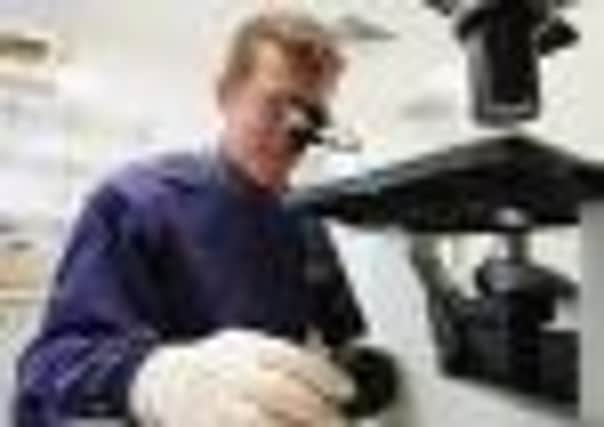Simple blood test could detect cancer five years early, say doctors


A total of 10,000 people are being sought to take part in the Early Cancer Detection Trial at centres across the country.
The medical breakthrough means tumours can be diagnosed before they cause any health problems, and it is believed Early CDT could revolutionise the way solid tumours, such as lung, breast, colon and prostate cancers, are detected and treated, thereby saving lives.
Advertisement
Hide AdAdvertisement
Hide AdThe tests look at antibodies and detect any abnormal growths at a microscopic level, before they become what is referred to as “radiological cancer”.
Lung cancer, which claims 5,000 lives north of the Border every year, is often picked up too late, as symptoms can be mistaken for other less serious illnesses.
Dr Tom Fardon, consultant chest physician at Ninewells Hospital and a senior lecturer at Dundee University, and one of those leading the project, is hosting a talk at the university tomorrow, entitled “Lung cancer: will early detection save lives”, to discuss the findings.
Dr Fardon said the trial partners – the universities of Dundee and Glasgow, NHS Tayside and NHS Greater Glasgow and Clyde – are hoping to recruit 10,000 people from these areas.
He said yesterday: “As well as talking about the aim of the trial, and about lung cancer itself, I will be encouraging people to attend for a simple blood test if invited.”
Dr Fardon added: “This is an antibody test which can detect cancer at the microscopic level before it becomes a radiological cancer.
“Typically, lung cancer patients present very late, which obviously has an impact on prognosis and limits the treatment options.
“Patients who have a positive test will be randomised to receive a CT scan to see if the cancer has advanced to an operable stage. If it has, we may be able to operate and if not, we will use other treatments to manage the cancer.
Advertisement
Hide AdAdvertisement
Hide Ad“At the end of the trial, we will compare the results with those achieved by the current best practice, and we hope to see a marked improvement in outcomes.”
Dr Fardon said it was hoped the trial would be able to begin later this year.
The most common cause of lung cancer is long-term exposure to tobacco smoke. Non-smokers account for around 10 to 15 per cent of cases.
Symptoms are coughing, including coughing up blood, weight loss and shortness of breath.
Worldwide, lung cancer is the most common cause of cancer-related death in both men and women.
The British Science Association lecture takes place at the D’Arcy Thompson Lecture Theatre, Tower Building, Perth Road, Dundee, at 7pm tomorrow. Admission is free.